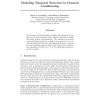Free Online Productivity Tools
i2Speak
i2Symbol
i2OCR
iTex2Img
iWeb2Print
iWeb2Shot
i2Type
iPdf2Split
iPdf2Merge
i2Bopomofo
i2Arabic
i2Style
i2Image
i2PDF
iLatex2Rtf
Sci2ools
118
click to vote
NIPS
2001
2001
Modeling Temporal Structure in Classical Conditioning
The Temporal Coding Hypothesis of Miller and colleagues [7] suggests that animals integrate related temporal patterns of stimuli into single memory representations. We formalize this concept using quasi-Bayes estimation to update the parameters of a constrained hidden Markov model. This approach allows us to account for some surprising temporal effects in the second order conditioning experiments of Miller et al. [1, 2, 3], which other models are unable to explain.
NIPS 2001 | NIPS 2007 | Surprising Temporal Effects | Temporal Coding Hypothesis | Temporal Patterns |
Related Content
| Added | 31 Oct 2010 |
| Updated | 31 Oct 2010 |
| Type | Conference |
| Year | 2001 |
| Where | NIPS |
| Authors | Aaron C. Courville, David S. Touretzky |
Comments (0)

